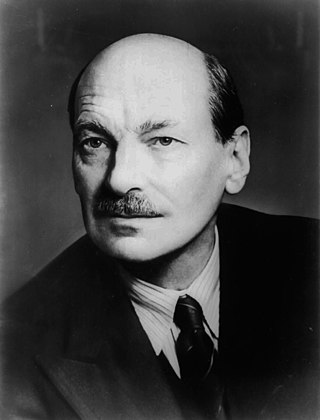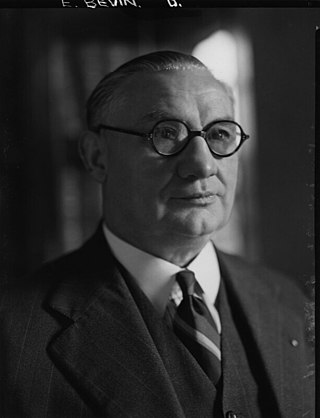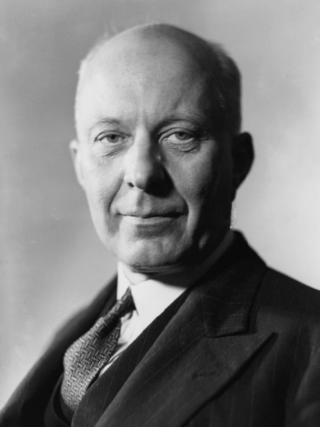Related Research Articles

The 1945 United Kingdom general election was a national election held on Thursday 5 July 1945, but polling in some constituencies was delayed by some days, and the counting of votes was delayed until 26 July to provide time for overseas votes to be brought to Britain. The governing Conservative Party sought to maintain its position in Parliament but faced challenges from public opinion about the future of the United Kingdom in the post-war period. Prime Minister Winston Churchill proposed to call for a general election in Parliament, which passed with a majority vote less than two months after the conclusion of the Second World War in Europe.

The Transport and General Workers' Union was one of the largest general trade unions in the United Kingdom and Ireland – where it was known as the Amalgamated Transport and General Workers' Union (ATGWU) to differentiate itself from the Irish Transport and General Workers' Union – with 900,000 members. It was founded in 1922 and Ernest Bevin served as its first general secretary.

Ernest Bevin was a British statesman, trade union leader and Labour Party politician. He cofounded and served as General Secretary of the powerful Transport and General Workers' Union from 1922 to 1940 and served as Minister of Labour and National Service in the wartime coalition government. He succeeded in maximising the British labour supply for both the armed services and domestic industrial production with a minimum of strikes and disruption.

Alan Thomas Howarth, Baron Howarth of Newport,, is a British Labour Party politician and life peer who was a member of Parliament (MP) from 1983 to 2005. First elected as a Conservative before defecting to Labour in 1995, he is one of few politicians in recent years to have served as a minister in both Labour and Conservative governments. He currently sits in the House of Lords as a Labour life peer.

Edward Hugh John Neale Dalton, Baron Dalton, was a British Labour Party economist and politician who served as Chancellor of the Exchequer from 1945 to 1947. He shaped Labour Party foreign policy in the 1930s, opposing pacifism; promoting rearmament against the German threat; and strongly opposed the appeasement policy of Prime Minister Neville Chamberlain in 1938. Dalton served in Winston Churchill's wartime coalition cabinet; after the Dunkirk evacuation he was Minister of Economic Warfare, and established Special Operations Executive. As Chancellor, he pushed his policy of cheap money too hard, and mishandled the sterling crisis of 1947. His political position was already in jeopardy in 1947 when he, seemingly inadvertently, revealed a sentence of the budget to a reporter minutes before delivering his budget speech. Prime Minister Clement Attlee accepted his resignation; Dalton later returned to the cabinet in relatively minor positions.

In the politics of the United Kingdom, a National Government is a coalition of some or all of the major political parties. In a historical sense, it refers primarily to the governments of Ramsay MacDonald, Stanley Baldwin and Neville Chamberlain which held office from 1931 until 1940.
Christopher Paget Mayhew, Baron Mayhew was a British politician who was a Labour Member of Parliament (MP) from 1945 to 1950 and from 1951 to 1974, when he left the Labour Party to join the Liberals. In 1981 Mayhew received a life peerage and was raised to the House of Lords as Baron Mayhew. He is most known for his central role in founding the Information Research Department (IRD), a secret wing of the UK Foreign Office dedicated to Cold War propaganda.

Sir Kenneth Gilmour Younger KBE was a British Labour politician and barrister who served in junior government posts during the Attlee government and was an opposition spokesman under Hugh Gaitskell but retired from Parliament early, disillusioned by party politics.
Malcolm Stewart McCorquodale, 1st Baron McCorquodale of Newton, KCVO, PC was a British businessman and Conservative politician.
John Reginald Bevins was a British Conservative politician who served as a Liverpool Member of Parliament (MP) for fourteen years. He served in the governments of the 1950s and 1960s, playing an important role in establishing independent television.

The Ministry of Labour was a British government department established by the New Ministries and Secretaries Act 1916. It later morphed into the Department of Employment. Most of its functions are now performed by the Department for Work and Pensions.

The Churchill war ministry was the United Kingdom's coalition government for most of the Second World War from 10 May 1940 to 23 May 1945. It was led by Winston Churchill, who was appointed prime minister of the United Kingdom by King George VI following the resignation of Neville Chamberlain in the aftermath of the Norway Debate.

Captain Harold Richard Adams was a British Labour politician who served as the Member of Parliament for Balham and Tooting from 1945 to 1950, and Wandsworth Central from 1950 to 1955.

The British Labour Party grew out of the trade union movement of the late 19th century and surpassed the Liberal Party as the main opposition to the Conservatives in the early 1920s. In the 1930s and 1940s, it stressed national planning, using nationalisation of industry as a tool, in line with Clause IV of the original constitution of the Labour Party which called for the "common ownership of the means of production, distribution, and exchange, and the best obtainable system of popular administration and control of each industry or service".

The Whitechapel and St George's by-election, 1930 was a parliamentary by-election held on 3 December 1930 for the British House of Commons constituency of Whitechapel and St George's in the Metropolitan Borough of Stepney.

Herbert Stanley Morrison, Baron Morrison of Lambeth, was a British politician who held a variety of senior positions in the Cabinet as a member of the Labour Party. During the inter-war period, he was Minister of Transport during the Second MacDonald ministry, then after losing his parliamentary seat in the 1931 general election, he became Leader of the London County Council in the 1930s. After returning to the Commons, he was defeated by Clement Attlee in the 1935 Labour Party leadership election but later acted as Home Secretary in the wartime coalition.
The Woolwich East by-election of 14 June 1951 was held after the death of Labour MP Ernest Bevin. The seat was safe, having been won at the 1950 United Kingdom general election by over 12,000 votes
The 1955 Greenock by-election was a parliamentary by-election held on 8 December 1955 for the British House of Commons constituency of Greenock in Renfrewshire, Scotland.
In the run up to the 1992 general election, various organisations carried out opinion polling to gauge voting intention in the United Kingdom. Results of such polls are displayed in this article. The date range for these opinion polls are from the election to 8 April.

The 2019 Dorset Council election was held on Thursday 2 May 2019 to elect councillors to the new Dorset Council in England. It took place on the same day as other district council elections in the United Kingdom.
References
- ↑ Leigh Rayment's Historical List of MPs
- ↑ Janus, Cambridge University Library